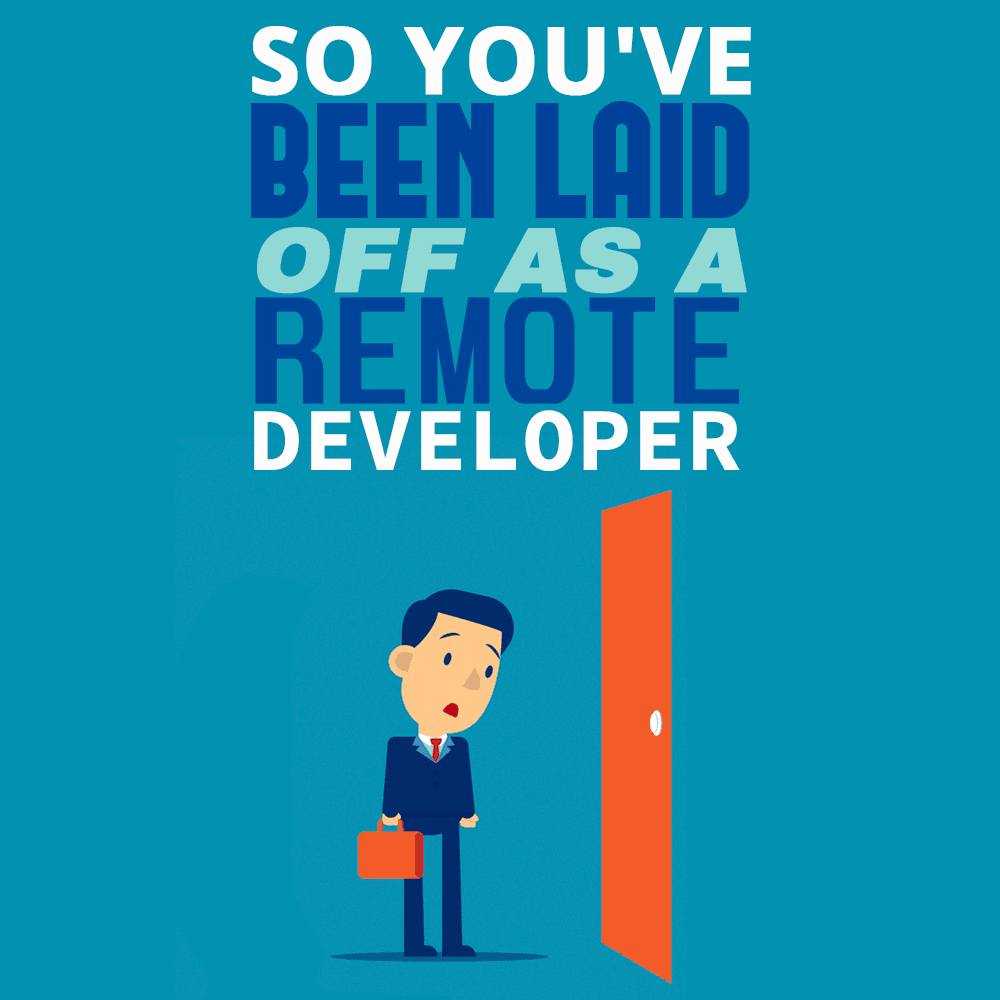 Here's the situation: It is 2020, the COVID-19 pandemic has struck, most of us are working remotely, and we know that costs will need to be cut.
Here's the situation: It is 2020, the COVID-19 pandemic has struck, most of us are working remotely, and we know that costs will need to be cut.
Many businesses need to enter a cockroach phase to get at least a fighting chance to battle through the next 12-18 months. There will be many consequences, and one of them will be that friends around us will be laid off or made redundant.
This will be particularly damaging for many startups all over the world, which always have to delicately balance the cash flow to ensure that their employees' families are fed.
Just picture this: Your manager messages you one morning, with four dreaded words: “We need to talk.”
He isn’t in his usual optimistic mood, he is being serious. This is going to be a hard conversation. And so, the video call starts. Before words are spoken, you look at each other and you know what is to come.
It is game over, and there is just enough money in the bank to pay for the notice period—at least you have that comfort.
Up until now, you’d noticed the signs of this situation approaching but chose to ignore them. The contractors were let go months before, you’d felt that something in your gut but hoped that you were being paranoid.
Two weeks ago the newest Junior developer was cut, on the hope to marginally increase the runway, which made it more real.
You should have listened, you should have been more proactive.
Part of you feels like you could have done more but frankly, there is nothing you had control over.
Although paraphrased, this happened to me last year. In fact, in 2019 alone I was made redundant twice, I was always one of the last members of staff left on the team.
This is the risk of working in startups.
The hope is that if we strike gold if we can attain product/market fit while securing a little bit of equity we can be successful.
As the current situation shows, it's hard to anticipate everything. But being prepared when such a crisis comes, can really make a difference. In this post I'll share with you what I've learned —the hard way— so that you can be better prepared, too.
Having Empathy for Those Around You
In a startup, there are two main groups of people affected by such as an event: your colleagues and the directors.
Almost all of the time, sympathy goes to the employees. Usually, this is the only lifeline they have, they need to feed their family, and most of the time they don’t have much in terms of savings.
Directors or owners, on the other hand, are aware of the financial health of the business; they may have to use personal savings and often take a lower salary if at all. In some cases, they rely on more tax-efficient methods such as dividends or director's loans.
In the majority of the pre-revenue startups I have personally worked with, most of the directors have followed this playbook.
Being an entrepreneur is isolating, and there is evidence that describes the psychological price of leading a company.
The responsibility of these individuals is to make sure that their employees are taken care of, regardless of the effects upon themselves.
As a member of staff, if you have the emotional control to step back and appreciate the situation at a high level, you’ll gain insight into who is in pain and who needs help.
If you notice someone that isn’t speaking, be proactive and reach out, let them know that you have their back.
It is more difficult to have these conversations being remote, as we can’t respond from normal emotional cues as we could do face-to-face.
After all, we are all human, we are all in this together.
Renegotiating Your Current Role

- The company has completely run out of money and is likely to enter administration.
- The company needs to cut costs to survive.
- The company needs to let everyone go but there could be an opportunity in the future once the dust has settled.
For all of these options, it is highly recommended that you put most of your time into building up your personal brand.
The positive is if you haven’t been one of the first to be let go, then it is likely that losing you would result in a negative impact on the business.
In the meantime, you can pursue a direct conversation with management to further gauge the current financial situation with this framing.
“I know that over the next 12-18 months it is going to be a cost-cutting exercise for the company to even survive, this is what I can do for you…”
Feel free to add your own value proposition but I would go with something like this.
If you do enjoy your job or you need a level of security proactively, have an informal call to change your working days from 5 to 4 (or less) for 80% of your pay.
These choices and decisions you offer forward will put you in a frame where you have empathy and an understanding for the situation of the business. As a result, you’ll be higher valued and respected.
If they are adamant on cutting costs and finding a solution, they may respond with:
- Thank you for the offer but we need you full time to hit our targets.
- Yes, this will be a problem, let's figure something out.
- We need everyone to work full time, would you consider taking a pay cut?
In the final case, if you are a high performer you might be able to have equity discussions or other kinds of benefits. You have to be careful as any type of pay cut will put you in a weaker position; you’ll be delivering the same value at a lower cost to the business.
You need to be aware that you could be manipulated into this position especially if you feel that there aren't many options for you.
In my first software developer role, I worked for a company for over three and a half years. There was a period when money was running out and clients weren’t purchasing as much as expected. All of the developers were given a choice to keep their jobs, but for a 50% pay cut.
In retrospect, being a remote developer in an isolated bubble and having no idea of the demand for my skill set, I accepted the terms.
To make matters worse I didn’t even think about having a conversation about equity, I was naive.
A lot of developers make this mistake, and hold the belief that what they deliver is not worthy of equity, let alone having such uncomfortable conversations.
With all of this said, for the majority of startups that are successful there are peaks and valleys; and there will always be exercises in cost-cutting.
Whether you want to ride this rollercoaster at your own peril is up to you.
Be a Professional, and Refuse to Burn any Bridges
Last year I joined a new team. It was evident that there was an underlying cloud of resentment in the air toward management.
The core culture of the team was poisoned, their goals and opinions were fragmented, all progress toward a common mission ground to a halt.
I came in as an outsider, unaware of the internal politics of the team. Unbeknownst to the employees, a couple of months later there was a redundancy event which was rough, on all of us.
There were bad decisions made on both sides of the fence, a clear lack of transparency, and hardly any kind of communication.
What transpired was a public release of the issues the staff faced, naming and shaming the company.
Whatever good intentions there could have been, this action was inappropriate, malicious, and irresponsible. This fallout damaged the company’s fundraising efforts and the reputation of the staff ability to secure future work, for those that had participated.
Throughout all of this, I felt stuck in the middle. I kept my head down when others wouldn’t, I completed all projects that had been abandoned, and delivered upon our prior promises.
I kept in communication with the team, and although I became frustrated at times, I had a duty to do my job to the best of my ability.
I experienced first hand that negativity feeds negativity. This cycle affects people's mental health, and should be avoided even if it means standing up to experienced professionals whom you admire.
You need to be able to take a step back, remind yourself that everything you are experiencing is temporary, and be able to see the forest for the trees.
As a developer, especially as a senior, your role is to deliver and support your team. As you grow as a professional, you’ll understand that being a value creator is only a small part of what makes a business successful.
A little bit of empathy goes a long way. Interpersonal skills such as these do take a long time to mature, but that is the primary prerequisites into technical lead and CTO roles.
Dust Yourself off, Make a Plan, and Execute

I’ve personally had the most success in recent years by reaching out to people in my network, specifically individuals that I have previously worked with who are connected with angel investors.
Most young startups are low on cash reserves, and when every hire they make is a substantial risk, such attributes like trust and loyalty are vital.
By connecting with angel investors you might be able to uncover new startups that are looking for your experience. If you can get an intro, it is likely that you would be in an advantageous position by leveraging the reputation of an angel.
Although you might be in an early stage in your career, and your network could be small, it doesn’t hurt to raise your hand up and directly ask for help. As you continue to stack years of experience you’ll gain a better focus of the path you want to follow and the actions you need to take to reach your goals. Your career is a long game—there will be lots of unknown opportunities ahead of you, and no one knows what the future will hold.
I’ve never been placed in a role through a hiring manager or recruiter, all of my work has been sourced by direct conversations with a co-founder, through my own personal brand or network.
The regular path of finding a recruiter, or applying to a job that has dozens if not hundreds of applications is too slow. There is hardly any benefit to having to wait for the decision to even get a possible interview after 3-4 weeks, I prefer a more proactive and direct approach.
If you can show value upfront and prove your insight without asking for anything in return, you will have a greater opportunity to be successful and find your next role.
The faster you move after getting the negative news, the better, as time is against you—your last paycheck is in sight.
If you need inspiration of how more successful developers market themselves take a look at their websites, their blogs and social media. You might be starting out but we have all been at that stage once in our career.
